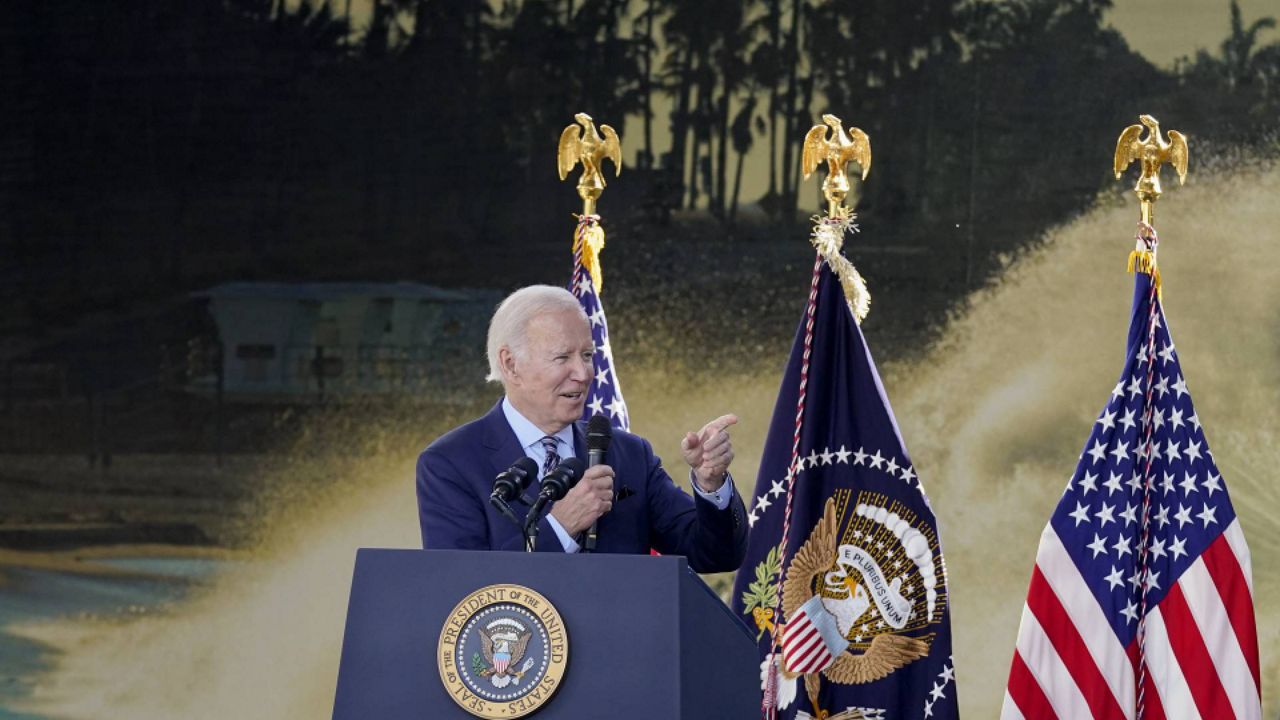President Joe Biden was in California Friday to highlight investments from the bipartisan semiconductor chip bill he signed earlier this year to help bolster the domestic supply chain, also noting his work to aid veterans and throwing support behind Democrat Mike Levin, who is running for reelection in a tight district race.
Biden spoke at communications company Viasat, which uses chips in its equipment and has a focus on hiring veterans.
The president reflected on his many trips to Iraq and Afghanistan as a senator and then vice president, noting his son Beau's service and time spent near burn pits, which he has connected to the brain cancer that killed him in 2015.
"We have an obligation" to veterans, the president said Friday, speaking about the sometimes days-long wait times to get Veterans Affairs health care.
"That ends" with the bipartisan PACT Act to strenthen veterans' care, which became law this year, Biden said. "You've got to be seen immediately. Because it's literally life and death for an awful lot of folks."
Viasat has more than 700 veteran employees across the U.S., according to the White House.
Biden credited Rep. Levin with helping pass that veterans bill and separate efforts to strengthen the manufacturing workforce.
"We are once again supplying the world the things they need," he said. "The focus on each of these investments is what Mike has really focused on -- in training workers, hiring veterans, jobs [paying] a prevailing wage."
Less than one week before the midterm elections end, the president's California visit is also another in a string of trips highlighting the $280 billion CHIPS and Science Act, which included $52 billion for semiconductor research, development, manufacturing and workforce. The majority of the chips are made overseas, which created backlogs during the pandemic and led to higher prices of things like appliances and cars.
"What you do here this company really matters," he told employees at Viasat, which is based in Carlsbad.
"So much of it depends on semiconductors, those tiny computer chips the size of a fingertip that power our everyday lives and power more and more of what we need -- smartphones, automobiles, washing machines, hospital equipment, you name it," he said. "America invented the computer chip....We led the industry for decades. Then something happened: America stopped investing in America."
Biden previously stopped at the groundbreaking of Intel’s Ohio chip manufacturing facility, part of a $20 billion commitment from the company, and he later toured IBM’s Poughkeepsie campus and then made another stop in Syracuse, New York, to spotlight Micron’s $100 billion investment in the area.
"I contacted a number of leading companies in the world, in the United States and said, 'Are you more inclined to invest in something you need if the federal government's making a significant investment?'" Biden said. "They said yes."
The president Friday highlighted the semiconductor chips effort as part of his broader effort to strengthen manufacturing in the United States, adding jobs and bolstering the supply chain after gaps were exposed during the pandemic.
Days before the midterms, Biden has continued to contrast his focus on manufacturing and lowering costs with some Republicans’ plans to repeal the Democrats’ sweeping climate, tax and health care bill, which includes money for things like clean energy and competitive drug pricing.




